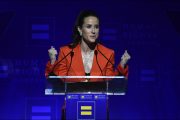
A federal judge temporarily blocked a California school district from forcing teachers to conceal students’ in-school gender changes from their parents.
U.S. District Judge Roger Benitez issued a preliminary injunction Thursday against an Escondido Union School District (EUSD) policy that requires teachers, on the one hand, to immediately accept a student’s new gender identity and begin using the student’s preferred name and pronouns and, on the other hand, to refer to the student by his given name and biological sex when speaking with his parents unless he consents to their being informed of his gender switch.
Represented by attorneys from the Thomas More Society, Elizabeth Mirabelli and Lori Ann West, teachers at Escondido’s Rincon Middle School, filed a federal lawsuit against EUSD in April, charging that the policy infringes on their First Amendment rights.
The EUSD policy was promulgated in August 2020 by executive staff, was never subjected to public debate, and was not even communicated to teachers at the time. Its existence was only uncovered when a substitute teacher unwittingly violated it in late 2021, after which, in February 2022, the district gave an online presentation on the policy to teachers. That presentation stated that a teacher who revealed a student’s “transgender status to individuals who do not have a legitimate need for the information, without the student’s consent,” could be subject to discipline under the district’s discrimination and harassment policy. Among those individuals with no “legitimate need” to know about students’ gender choices are “parents or caretakers,” averred the presentation.
Mirabelli and West, both Christians, objected to this policy not because they have any desire to harm transgender students, but because they felt it was being dishonest with parents — which, by the way, violates another EUSD policy. The district refused to grant them religious exemptions, merely telling them that if, in the course of a conversation with a parent, the parent were to inquire about his or her child’s gender identity, the teacher was to respond that “the inquiry is outside the scope of the intent of [my] interaction and state that the intent of the communication, may involve behavior as it relates to school and class rules, assignments, etc.” The teacher could refer the parent to an administrator to discuss the matter; but, as an EUSD attorney told the court, “Ultimately, an administrator would respect the child’s wishes not to disclose and respect their privacy.”
EUSD argues that its policy is in keeping with California law and state Education Department guidelines.
While recognizing that the Education Department has encouraged schools to conceal students’ gender changes from parents, Benitez doubted that children really have a right to privacy under either state or federal law broad enough to keep their parents from being informed of their gender confusion. Furthermore, he observed, “A student who announces the desire to be publicly known in school by a new name, gender, or pronoun and is referred to by teachers and students and others by said new name, gender, or pronoun, can hardly be said to have a reasonable expectation of privacy or expect non-disclosure.”
More importantly, though, both the Constitution and federal law guarantee parents primacy in their children’s upbringing. “The United States Supreme Court has historically and repeatedly declared that parents have a right, grounded in the Constitution, to direct the education, health, and upbringing, and to maintain the well-being of, their children,” wrote Benitez. Furthermore, the federal Family Educational Rights and Privacy Act (FERPA) “requires schools to provide parents the opportunity and the right to inspect and review their child’s education records,” making “the privacy right of a child” take “second place to his or her parents’ right to know.”
Transgender clinical psychologist Erica Anderson gave a declaration in support of the plaintiffs’ motion — a declaration that went “unrebutted,” Benitez noted — stating, “I am not aware of any professional body that would endorse EUSD’s policies which envision adult personnel socially transitioning a child or adolescent without evaluation of mental health professionals and without the consent of parents or over their objection.”
“By facilitating a social transition at school over the parents’ objection, a school would drive a wedge between the parent and child,” Anderson explained. “Similarly, facilitating a double life for some children, in which they present as transgender in some contexts but cisgender in other contexts, is not in their best interest.”
Thus, penned Benitez, “EUSD’s policy of elevating a child’s gender-related choices to that of paramount importance, while excluding a parent from knowing of, or participating in, that kind of choice, is as foreign to federal constitutional and statutory law as it is medically unwise.”
Benitez’ conclusion:
The school’s policy is a trifecta of harm: it harms the child who needs parental guidance and possibly mental health intervention to determine if the incongruence is organic or whether it is the result of bullying, peer pressure, or a fleeting impulse. It harms the parents by depriving them of the long recognized Fourteenth Amendment right to care, guide, and make health care decisions for their children. And finally, it harms plaintiffs who are compelled to violate the parent’s rights by forcing plaintiffs to conceal information they feel is critical for the welfare of their students — violating plaintiffs’ religious beliefs.
The injunction, of course, does not guarantee that the court will ultimately rule in the teachers’ favor, but it does protect them — and students and parents — until their case is decided.




